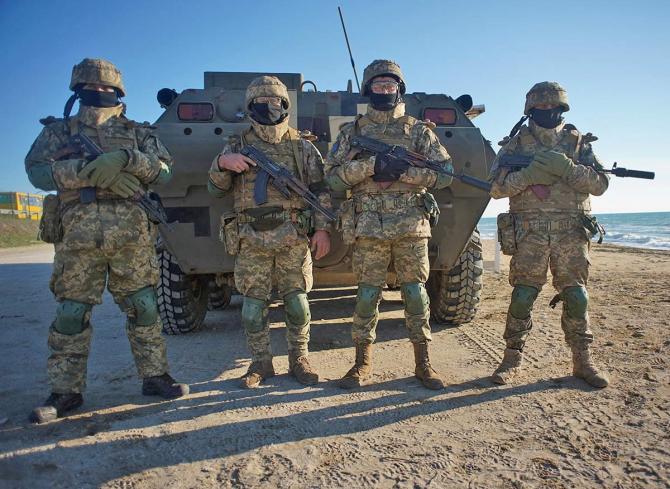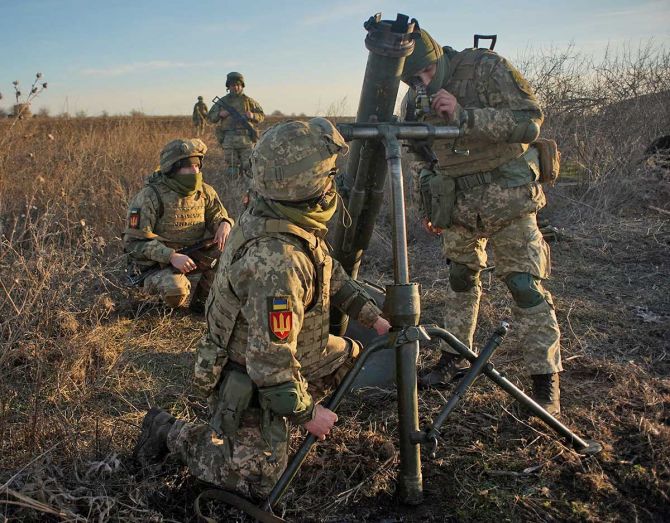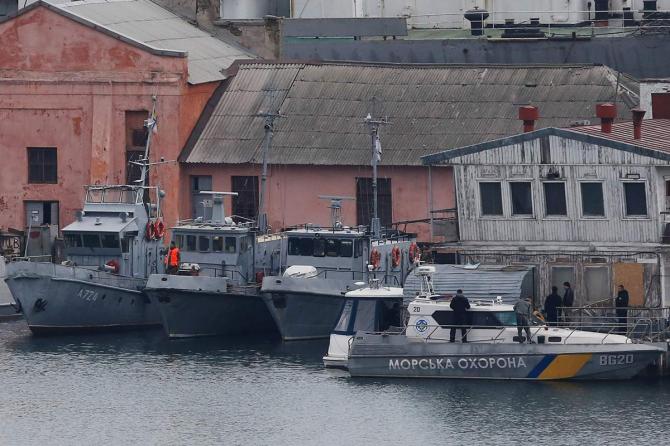'It makes no sense at all to leave because I have my whole family with me.'
'My wife and children are citizens here.'

Kamaljit Singh is not going anywhere.
Not he. Nor his son or daughter. Or his Ukrainian wife.
His restaurant has been shuttered for the past few days.
He runs Curry House, a well-established Indian restaurant that serves up Punjabi menu stalwarts like Butter Chicken, Malai Kofta, Achari Gosht on Havanna Street, in 19th century city-centre Odessa.
He and his family are sitting at home.
Waiting.
And waiting,
They are not sure even sure what they are waiting for.

Singh -- who sounds very calm, practical but resigned, in an interview to Vaihayasi Pande Daniel/Rediff.com on late Saturday night, in Hindi and English over the telephone from Odessa -- is waiting for several, unknowable things.
For hopefully, by a miracle, the fighting to abate.
For some other kind of solution, not envisioned yet, to present itself.
For the vague possibility that the Indian embassy in Kyiv will organise a more streamlined centralised evacuation to India, that will also allow him to take his wife and children too, who are not Indian citizens.
"Dekhiye abhi filhaal mere ko koiee sense nahin banti yahan se nikalane mein, kyonki puri family hai. Meri jo wife aur bache yahan ke citizen hai (Look, at present it makes no sense at all to leave from here because I have my whole family with me. And my wife and children are citizens here)."
So even if with the assistance of the Indian government he is able to leave, he, of course, can't leave them behind. "Mere paas toh documents hai. Inke paas problem create ho jayega, iss liye mein hilla nahin yahan se (I have the right documents. But for them it will be a problem and that's why I have not moved from here)."

Singh has carefully thought it through further.
He has decided to ignore any extremely human impulses to flee with his wife and children to any of the borders in the west, facing Romania or Poland, where Ukranian, Indian and other citizens are desperately gathering by the thousands. It's still possible to reach there, because, though going by road is impossible, trains are running.
But Singh doesn't feel it is sensible to get out of the safety of their home and go somewhere for the sake of it, for the sake of taking some sort of knee-jerk action-reaction.
"Dusri baat ki kisi bhi border area mein aisa koiee sahulyat nahin hai filhaal. Wahan par camps hai, theek hai, but camps are camps (The other thing is that those border areas do not have anything favourable about them. Yes, true, there are camps, but camps are camps)."
Singh knows, from those he has been speaking to, that the arrangements are rather basic. Food and other facilities are poor. People are miserable.
"Conditions kharab hai. Mein bachche ke saath nikal nahin sakta. Main unko camp mein nahin baitha sakte hai. Ek doh din mein minus ho jayega aur barf bhi barhne shuru ho jayegee Odessa mein aur bakee sab areas mein bhi aur problem create ho jayega (The conditions are bad. I can't leave with my children and park them in a camp. In one or two days the temperatures are going to dip into the minuses and the snow will increase in Odessa and other areas and that will create a further problem)."

His family -- father, brothers and sisters -- back in Patiala, Punjab, are worried sick. "Sarein parishan hai (They are all troubled)."
But Singh firmly believes in not being rash and thinks it is safer to stay put.
Odessa, a sun-speckled charming town of one million, on the warm waters of the Black Sea, once the much-favoured playground of the Russian elite, was very quiet on Saturday. On Friday there was briefly some thunderous noises on the horizon. And then it went quiet.
"Kal subah kuch hua. Aaj subah bhi kuch hua tha. But that was the anti-aircraft system, jo laga hai, woh kaam kar raha tha. Koiee drone vagara enter kiya aur usko phor diya (Something happened yesterday morning. This morning something happened as well, but that was the anti-aircraft system kicking in. Some drone must have entered and it exploded it)."
Otherwise, Odessa is uncommonly quiet, though not ominously so, in his view -- "Totally sab kuch shanti hai (totally peaceful)."

Perhaps the quiet is more deceptive. Everyone is aware that they are in the midst of a war or "wartime," as Singh terms it, but there are not much trappings of it in evidence. That doesn't stop skyrocketing levels of anxiety. "Peace of mind toh nahin hai ji, woh toh natural hai ji (Nobody has peace of mind. That's natural)."
His children, who are teenagers, and have sufficient understanding of the situation, are equally anxious. "Sarein ke sarein parishan hai. Kisi ko bhi shanti nahi hai. Sab ka yahi haal hai (Everyone is troubled. No one has peace. Everyone in the same situation)"
But yet in Odessa, life is palpably normal, except for the presence of troops -- "army lagi huiee hai." He was able to go out in the morning pick up a whole load of groceries. He has had no trouble finding cash.
Once it grows dark, the city centre is deserted because "dopahar ke baad (post afternoon)" everyone has been asked to remain in their homes and armed troops are about the ensure this and people's safety.

Heavily fortified, Russian-occupied Crimea, the closest Russian 'border', is about 570 km away, roughly the same distance as there is between Mumbai and Goa.
Melitipol, in neighbouring Zaporizhia Oblast, lying 429 km and six hours by road due east, has been the scene of hectic fighting.
Unlike Kyiv and Kharkiv, Odessa does not have a subway. There are bomb shelters apparently, but Singh is not sure where they are.
But his home like most homes in Odessa has a basement so when or should the air sirens start up, he knows his family can take find refuge there.
"Basement mein bilkul shelter le sakte hai, but still I don't think iss kahani uss level tak jayegee. Bhagwan jante koshish to yahi hai. We are thinking that it won't go to this level (We can definitely take shelter in the basement. But I don't think the narrative will go that way. God knows that is what we are trying)."
He is certain that the Russians cannot be far, but is dealing with that fact impassively, distantly, like the thought is not yet fully processed.
He repeats several times reflexively: "Aaj toh kuch nahi sunai de raha. We cannot hear anything today. But matlab they are waiting. They are waiting -- Russian army bahut nazdik hai (the Russian army is very close). They are waiting.
"At this time there is nothing in Odessa, but I think so, aaj ya kal, matlab kabhi bhi ladai ho sakti hai. Filhaal shanti hai. (Maybe today or maybe tomorrow or maybe anytime soon the fight/the war will come to Odessa. But there is peace now)."
When warnings started up earlier in February, most of Odessa's American and European population hurriedly left "ladai ke pahile (before the fight/war)," says Singh. Probably they had the means to do so as well.
But many or most/all the Indians remained, in spite of the warnings, even though the beating of the war drums was getting louder and louder and frenzied. Perhaps they didn't think an invasion would come to pass.
Odessa has a more permanent population of about 50 Indians and a floating population of some 300-400 students, Singh, who has been living there for 20 years, estimates, studying in the city's medical and engineering colleges, among other institutions.
Everybody is in touch with each other and the Indian-to-Indian relationships are strong. Curry House, based on the online reviews, had frequent student diners.
Singh has been getting calls or making calls to find out about the students, who he calls paternally and concernedly "apne bachhe (our children)." About half of the student population left Odessa, and some of them set out for Kyiv. The rest remain.
"Kyiv mein bahut bura haal hai. Apne saarein bachhe -- mein subah se 3-4 phone kiya hai mere dost ko Kyiv mein. Humare embassy ke saath school tha, school mein baithe hai. (The scene in Kyiv is bad. I have called a friend 3-4 times today in Kyiv. Our children/students are all sitting in the school adjoining the Indian embassy there)."
He keeps getting updates about them. Among the students who left, most are still in Kyiv and others left for Lviv, in western Ukraine, and are sitting in camps there and it's not a good situation, he says.
Singh says that staying in Odessa, which ironically goes by the nickname of Humour Capital, turned out to be the best option for him -- well -- because it was his only option. "Problem hai ki abhi kuch nahin kar sakte hai (there is nothing else that we can do)," he says pragmatically, stoically.
Feature Presentation: Ashish Narsale/Rediff.com











 © 2025
© 2025